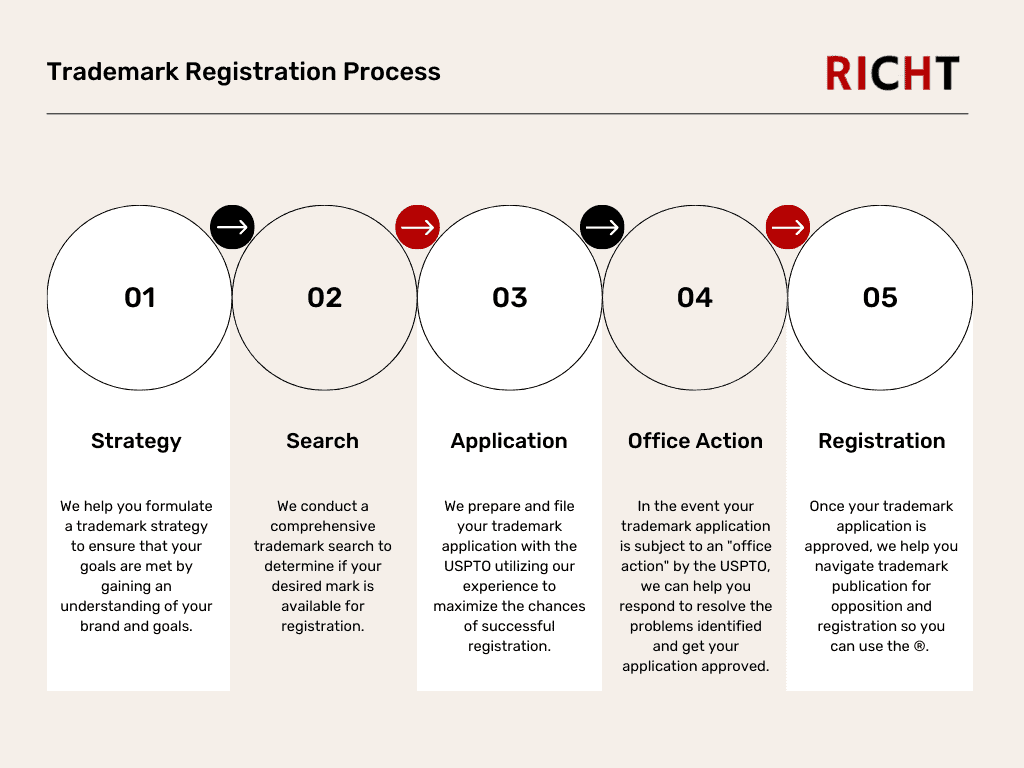Helping Businesses Build & Protect Their Brands
Via Trademark Law
Intellectual property (IP), in general, and trademarks, in particular, are increasingly becoming one of the most valuable assets of businesses. After all, the world of e-commerce is increasingly digital-first and data-heavy, and by extension, IP is a foundational element in such a digitized world. With IP steadily rising in import as a business asset to protect and monetize, branding and the protection of such value via trademark registration and the law play a leading role.
A trademark is one of the most common types of IP, in addition to other types of IP such as copyrights and patents, as well as trade secrets. While trademarks may seem relatively straightforward, the process and nuance surrounding a trademark’s lifecycle are more complex. From initial research and registration to maintenance and enforcement, as well as scams targeting trademark owners, there are pitfalls at each stage. Further, trademark disputes may arise, including in the context of advertising for your brand, such as using trademarks in search advertising. Trademarks are so nuanced that you might be surprised to learn that in addition to the common trademarking of words and logos, sounds and scents can also be trademarked.
Some common trademark law considerations include the distinction between a common law trademark and a registered trademark, the nuances of successfully pursuing trademark registration via the USPTO and navigating associated office actions, avoiding common errors in TEAS (Trademark Electronic Application System), whether the USPTO requires you to use an attorney for trademark registration, and enforcement of your mark post-registration. There are also considerations when it comes to trademarking a surname as well as the names of living people, including in the political context and the associated decision in this regard from the Supreme Court. Further, it is imperative to steer clear of using marks that might result in threats of or actual litigation, such as was the case recently in a matter involving Adobe’s trademarked logo. These are only a few of the myriad of critical components that a business must account for when establishing value via trademarks.
As a trademark registration lawyer, RICHT understands the value of trademark law and how, when correctly navigated, it can result in great returns, whether through brand-building, a subsequent business acquisition, licensing, or other means. The converse is true, too, though. Trademarks, when incorrectly pursued, such as may be more likely to occur when done through DIY (do it yourself) online trademark services, can result in a host of issues ranging from the refusal of registration to litigation. From those with an independent e-commerce brand to sellers on Amazon, as well as for SaaS, AI, startups, and related technology offerings, we provide unique value to clients via trademark registration and related areas of the law.
At RICHT, our singular goal is to help our clients seamlessly navigate the trademark lifecycle, including:
- Trademark Search & Clearance: We conduct a comprehensive trademark search to determine if your desired mark is available for registration.
- Trademark Strategy: We assist in formulating a trademark strategy that is more likely to result in a successful registration.
- Trademark Application: We prepare and file your trademark application with the USPTO, utilizing our experience to structure the application to maximize the chances of successful registration.
- Office Action Responses: If the USPTO issues an “office action” regarding your trademark application, we can help you respond, resolve the problems identified by the USPTO, and get your application approved.
- Trademark Registration: Once your trademark application is approved, we help you navigate trademark publication for opposition and registration so you can use the ®.
- Trademark Monitoring: We help ensure that you maintain your trademark and monitor for infringing use that, if left undisputed, could result in the loss of your trademark.
- Trademark Enforcement Against Infringing Use: If someone infringes on your trademark, we help you enforce your rights through a variety of means, including litigation.
The benefits of working with RICHT to secure your trademark registration include:
- Experience With Trademarks: Our firm has counseled clients on trademark law matters, from registration to infringement.
- A Full-Suite Of Trademark Law Services: We provide clients with a full suite of trademark law and related IP services, from registration to licensing.
- Law That Knows Business: Our firm’s ethos is “Law That Knows Business,” which summarises our focus on understanding our clients’ business goals and formulating legal solutions that help them attain those goals effectively and efficiently.
- Affordable Flat Fees: We aim to provide our clients with cost certainty via flat fees so that incentives are aligned and you can be confident that you are getting legal services in a cost-conscious manner.
Related Intellectual Property Law Services We Offer
Some Of The Types Of The Brands We Can Help









